Contents
Few gardeners have seedling growing conditions that meet the standards. Most often, plants do not have enough light, heat. You can solve the problem with the help of various biostimulants. One of them, Epin Extra for seedlings, has long been popular.
Let’s see what kind of drug it is, what are its advantages. But, most importantly, how to use Epin when processing peppers, tomatoes, strawberries, petunias and other plants.
Description and characteristics
Epin Extra is an artificial drug created by man. The tool has an anti-stress effect. It contains special components that can protect plants from negative environmental influences.
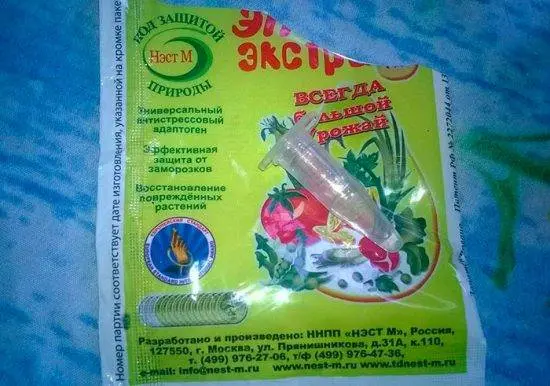
The drug has three medals of the All- Exhibition Center, as well as a diploma of the Scientific and Technical Society of the Ministry of Agriculture and Food. When there was an accident in Chernobyl, this biostimulant for plants was used to eliminate the consequences.
Seedlings treated with Epin Extra:
- protected from temperature extremes;
- tolerates drought or heavy rains;
- survives spring or autumn frosts without much loss;
- gives a higher yield, which ripens earlier than on untreated plants.
Biostimulator Epin began to produce more than 10 years ago. But due to mass fakes, it was decided to remove it from production. Then an improved tool appeared. Spraying seedlings with Epin Extra, according to gardeners:
- promotes the development of the root system;
- increases plant resistance;
- reduces the amount of nitrates, nitrites and pesticides in finished products.
Epin Extra is produced in small 1 ml plastic ampoules or in 50 and 1000 ml bottles. It has a pronounced alcohol smell and foams during the dilution of the solution, as it contains shampoo.
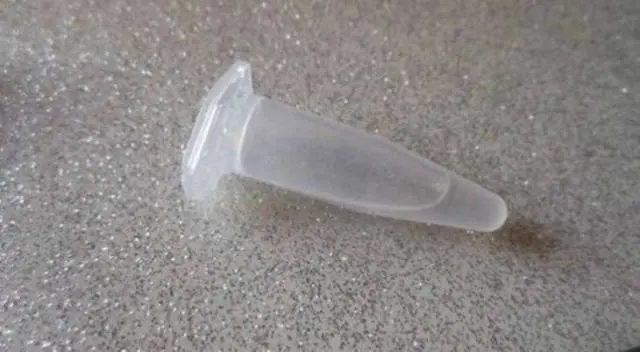
Many gardeners are interested in how to dilute the drug for seedlings in drops. So 1 ml corresponds to 40 drops.
Instructions for use
Before you start breeding Epin Extra, you need to read the instructions for use for seedlings of tomatoes, peppers and other horticultural crops. It is necessary to breed a means for treating plants, taking into account the recommendations.
The biostimulator can be used for soaking seeds, as well as spraying vegetables, flowers during different periods of the growing season.
How to dilute the stimulant
When preparing a working solution for watering or spraying plants, rubber gloves must be worn. You need to dose the drug with a syringe:
- Clean boiled water is poured into the container, the temperature of which is not less than 20 degrees. The amount of water depends on the expected flow.
- Using a needle, pierce the ampoule and collect the desired dose of the drug.
- Add as many drops to the water as indicated in the instructions for a particular type of work. To completely dissolve the biostimulant, add a little citric acid to the water.
- Stir the feed water with a wooden spoon or stick.
The solution must be used within two days. The remains of the plant treatment agent can be stored in a dark room (destroys in the light). If after two days the entire solution is not used up, it is poured out, since it no longer represents any benefit.
dosage
Many gardeners are interested in whether it is possible to water flowers, seedlings of vegetable crops with Epin under the root. The instructions clearly state that the drug is used only for spraying, that is, foliar top dressing.
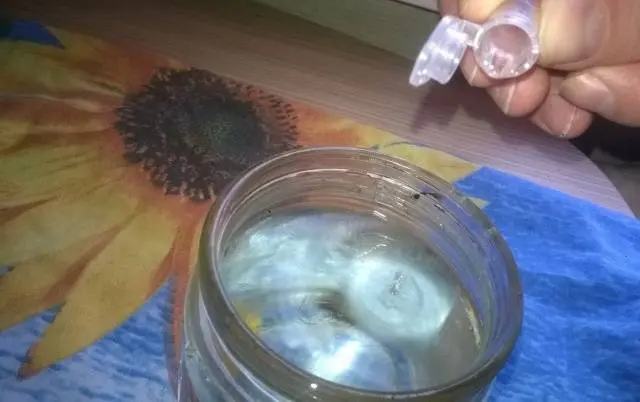
The biostimulator is used at any stage of the vegetation of the plant, including for seed treatment before sowing. The consumption of the drug for individual crops is indicated in the table below.
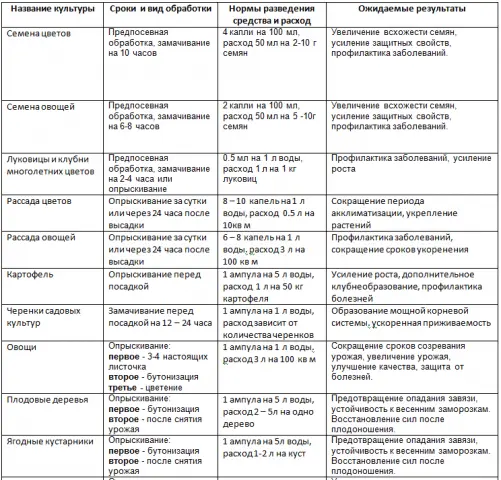
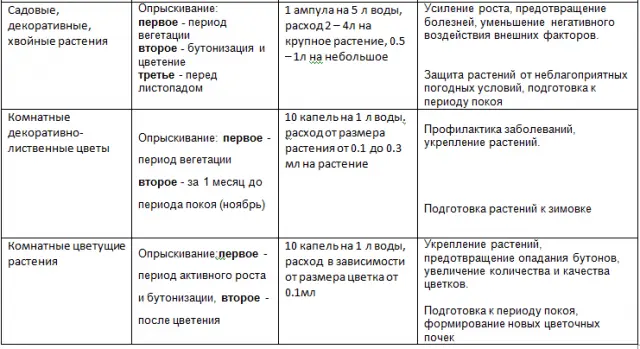
Timing and methodology
At different stages of the growing season, spraying plants requires a solution of different concentrations, with the obligatory dosage taken into account so as not to harm the seedlings:
- When 2-4 leaves appear in a liter of water, an ampoule of the drug is diluted and the seedlings are sprayed.
- About three hours before diving, the seedlings are treated with Epin: 100 drops of the drug are dissolved in 3 ml of water. Watering helps plants survive stress if the roots have been damaged.
- Before planting plants in a permanent place, the entire ampoule is diluted in 5 liters of water. Sprayed seedlings acclimatize and take root faster, in addition, resistance to late blight and alternariosis increases.
- When buds form and plants begin to bloom, 1 ml of the product is dissolved in a liter of boiled water. Thanks to this spraying, tomatoes and peppers do not drop flowers, all ovaries are preserved.
- If there is a threat of frost returning, there is a strong heat or signs of disease appear, it is necessary to increase the immunity of plants by treating them with a biostimulant solution several times in two weeks. The ampoule is dissolved in 5 liters of water.
Application for different crops
Tomatoes
To soak the seeds, use a solution of 3-4 drops of Epin per 100 ml of warm water. The seed is kept for 12 hours, then immediately sown without washing.
Now let’s figure out how to use Epin for seedlings of tomatoes:
- To spray tomato seedlings before picking, use a solution of two drops of the product in a glass of water.
- According to gardeners, tomato seedlings can be sprayed the day before planting in the ground or immediately after this procedure. The solution is made more concentrated: 6 drops of the product are added to a glass of water. Plants are treated with the same solution before frost.
- When buds form on the tomatoes, one ampoule of the biostimulant is dissolved in 5 liters of water to treat the plantings.
- The last time Epin, according to gardeners, is used on tomatoes at the end in August or September, when the time for cold fogs comes.
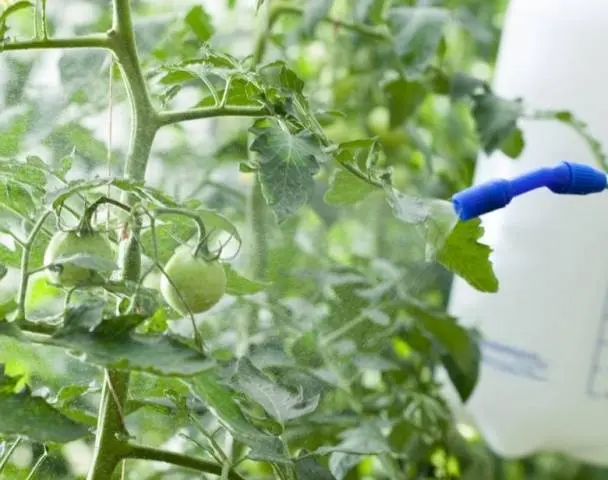
Peppers and aubergines
When growing peppers, a biostimulant is also used. For seedlings of peppers, Epin is used according to the instructions. The processing steps and dosage of the drug are identical to tomatoes.
Pumpkin cultures
This crop includes cucumbers, zucchini and pumpkin. Features of processing cucumbers:
- First, the seed is treated in a pink solution of potassium permanganate, then in a biostimulator for 12-18 hours. The solution consists of 100 ml of warm boiled water and 4 drops of a biostimulator.
- You need to spray cucumbers when 3 true leaves appear, or before transplanting if the plants were grown in a nursery. Epin for seedlings of cucumbers is diluted as follows: 200 drops of the product are added to 6 ml of water.
- Cucumbers are sprayed with the same solution in the budding phase and the beginning of flowering.
- Then the treatments are repeated several more times every 2 weeks.
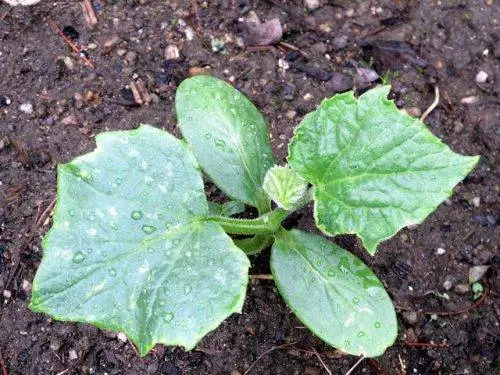
strawberry
- Before planting seedlings of this crop, they are soaked in a biostimulant solution in the proportion of 0,5 ampoules per 1000 ml of water.
- Seven days after planting, strawberry seedlings are sprayed with this Epin solution: one ampoule is dissolved in five liters of water.
- The next treatment is carried out when the strawberries release buds and begin to bloom, with the same composition.
Strawberry plantings are processed in the spring to save the plants from frost after harvesting last year’s leaves by dissolving 1 ampoule of a biostimulant in 5 liters of water. In autumn, when the crop is harvested and the leaves are cut, strawberries are sprayed with a more concentrated composition: 4-6 drops of Epin Extra are dissolved in a glass of water. Plantings can also be processed in October (an ampoule is dissolved in 10 liters of water), if a little snowy winter is expected. This will increase the immunity of strawberries.
Biostimulant for flowers
According to gardeners, Epin is also useful for flower seedlings. Dilute the product in accordance with the instructions. In a liter of water, dissolve 8-10 drops of a biostimulant. 500 ml of the resulting solution is enough to process 10 square meters. Spray flowers after planting in a permanent place to reduce stress, adapt quickly and root. You can repeat the treatment in two weeks with the same composition of the solution.
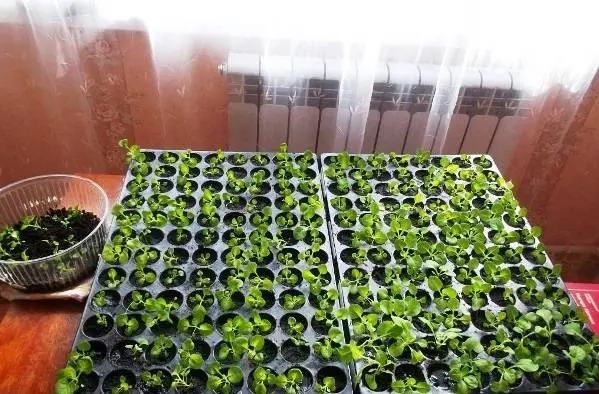
When and how to spray
For work choose a clear evening without wind. Spray with a fine mist sprayer. This is an important condition, because the droplets of the solution should settle on the leaves, and not on the soil.
Treatment of plants with a biostimulant also helps in pest control, as the hairs become stiff, it is impossible to bite through them. The biostimulator does not kill pests, but helps to increase the vitality of the plant, activates its resistance.
Some gardeners use Zircon. They are interested in which is better, Epin or Zircon for seedlings.
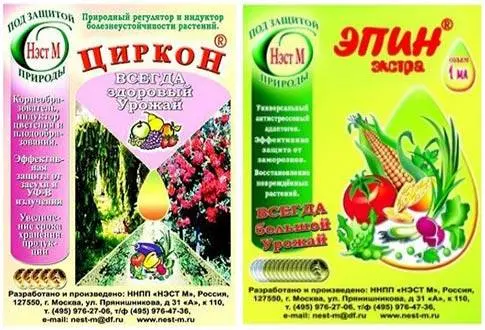
It should be noted that both drugs are good, they are used to treat seeds, seedlings and adult plants. Only Zircon acts on plants more harshly, so you need to be extremely careful when breeding.
What’s better:









